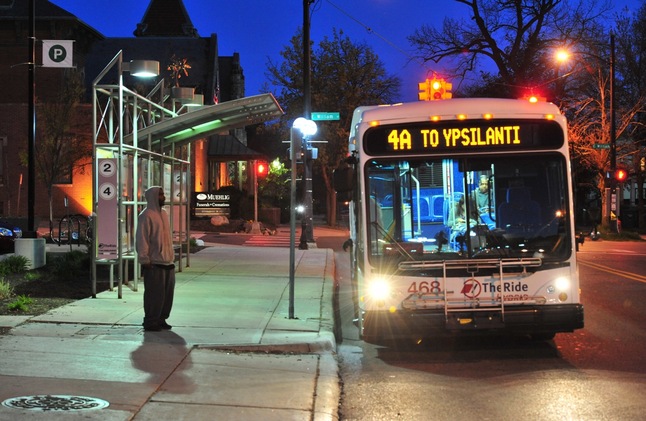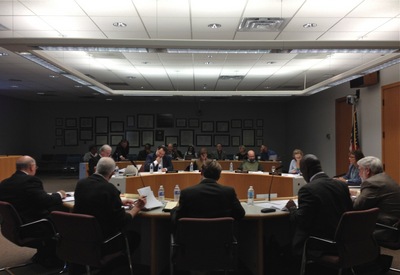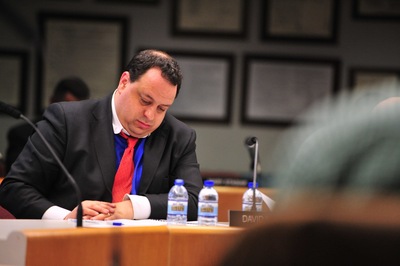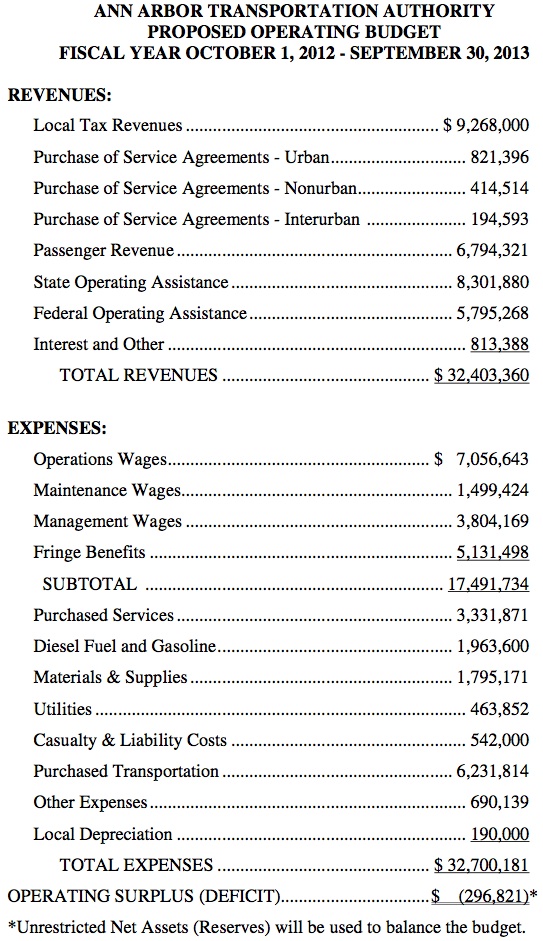AATA dipping $300K into cash reserves to maintain expanded services in upcoming budget year

The AATA's budget for 2012-13 includes a continuation of enhanced services on Route 4 along Washtenaw Avenue between Ann Arbor and Ypsilanti. Here, a Route 4 bus stops for passengers at the Blake Transit Center in Ann Arbor.
Ryan J. Stanton | AnnArbor.com
That's up slightly from the $30.4 million budget it approved this time last year when the agency decided to dip about $1 million into its cash reserves to get through the year, ramping up services in advance of the formation of a countywide transit authority.
Under the new budget, the agency plans to continue on the same path, taking another $300,000 from its reserves to make it through another year with expanded services.
That includes a continuation of enhanced services on Route 4 along Washtenaw Avenue between Ann Arbor and Ypsilanti, as well as expansion of the NightRide late-night, shared-taxi service and the AirRide roundtrip shuttle service between Ann Arbor and Detroit Metro Airport.

The AATA board met Thursday night to approve a budget for the fiscal year that dips $300,000 into the agency's cash reserves. The agency was planning to have a surplus budget until recently finding out it will lose $803,500 in state operating assistance.
Ryan J. Stanton | AnnArbor.com
"The fact is we are in an investment phase of this organization and so we are taking some federal dollars — not city of Ann Arbor property tax dollars, but federal dollars — and using those to invest in some services that provide opportunities to demonstrate what we can do in the direction of countywide service," Nacht said. "And that works for us in the short-term with this budget in a fiscally sound manner. It is not a long-term sustainable approach."
The board is planning to hold a special meeting on Tuesday when it plans to initiate the process of incorporating a countywide transit authority.
"We really feel the time is right," said AATA CEO Michael Ford.
AATA officials plan to put the question of a countywide transit tax before Washtenaw County voters next year. The 0.584-mill levy could raise about $7.7 million in the first year.
That would come on top of the more than $9.1 million Ann Arbor taxpayers already pay annually to fund the AATA under the city's 2.056-mill transit tax.
The city's existing millage would remain in place to help fund a new countywide transit authority called the Washtenaw Ride, which would replace the AATA.
AATA officials estimate the countywide assessment would cost the owner of a $200,000 home an additional $58 per year.
Nacht said it's important the public understands that if the AATA doesn't receive additional funding for countywide services, then the steps it has taken to provide additional services outside of Ann Arbor — including increased Route 4 trips — will need to be scaled back.
"Service such as that, which is not inexpensive, we can do as an investment to demonstrate to the broader community our ability to handle that service and to perform it admirably, and hopefully persuade a significant number of people to become riders," he said. "But we are not in a position to sustain the projected level of service that we're going to be offering the public outside of Ann Arbor in this next fiscal year into the indefinite future without additional funding."
AATA officials said they actually completed work Sept. 11 on a balanced budget for the upcoming year that included a modest surplus.
But those plans went out the window when the AATA received notification from the Michigan Department of Transportation on Sept. 14 that a new interpretation of the state's operating assistance formula would decrease the AATA's state aid for the upcoming year by $803,500.
Throughout the state, MDOT cut a total of about $8 million in funding for local bus systems in Ann Arbor, Grand Rapids, Lansing, Saginaw, Kalamazoo and Muskegon, AATA officials said.
Ford said that came as a surprise and his staff worked diligently to propose expense reductions in the budget that would neither negatively impact the public nor diminish services, but there still remains about $300,000 in uncovered expenses.
The rest of the budget was balanced through a combination of spending cuts, a wage freeze for nonunion employees and the use of federal funds now available for day-to-day operations.
Ford said reducing services to AATA passengers because of MDOT's decision was not an option the agency would consider.
"We're not proposing any reduction of service. I want to be really clear about that," Ford said. "We have the ability to utilize our federal funds to balance the budget. This is made possible by a recent transportation bill approved by Congress called Moving Ahead for Progress in the 21st Century."

David Nacht
Ryan J. Stanton | AnnArbor.com
AnnArbor.com is awaiting clarification from AATA officials on the reported $803,500 loss in state operating assistance. The budget approved Thursday night shows the agency still is counting on $8.3 million in state operating assistance.
That's down just $357,957 from the $8.66 million it budgeted this past year, and it's actually up from the $7.9 million the agency saw in the first 11 months of this past year.
Nacht said it's expected the agency will have about three months worth of cash reserves left at the end of the fiscal year and he's comfortable with that. The $32.7 million budget will allow AATA to continue offering advance implementation of services recommended in its recently released five-year countywide transit plan.
Ford said the budget includes cuts in staff and administrative funding, including foregoing filling some positions and delaying some projects.
"Basically it was a team effort," he said. "I think each department gave up something.
"Nonunion wages are affected. Bonuses are affected as well," Ford added. "That's not always a great subject to talk about but we had to make some hard decisions."
The AATA expects about $5.8 million in federal formula funds in next year's budget and plans to use $1.47 million for operating expenses, including services that are part of the countywide plan.
"In the long-term, we will need to allocate those federal dollars in other areas to maintain our bread-and-butter operations for the taxpayers of Ann Arbor and for the people we have purchase-of-service agreements with," Nacht said. "But in the short-term, staff has done an admirable job."
Getting to work
The board also adopted a new work plan Thursday night. It contains priority items and goals for the next year, including $5.8 million in capital items and $3.1 million in operating expenses. Most of the capital dollars are for the $5.5 million rebuild of the Blake Transit Center downtown.
The agency is planning to move forward with complete demolition and reconstruction of the 1980s-era building soon. AATA officials are interviewing contractors through Oct. 5 and a presentation on the project timeline and costs is expected at the board's Oct. 18 meeting.
Other work plan items include implementation of the agency's 30-year master plan, branding and development of a logo for a new countywide authority, marketing, continuation of VanRide services, implementation of new park-and-ride agreements, establishment of a governance model for a new countywide authority and a review/revision of fares and ticketing.
The work plan also shows $230,000 worth of staff time going toward continued planning efforts for the WALLY commuter rail initiative, which is aimed at linking Ann Arbor and Howell.
It also includes $1.5 million in costs for the Ann Arbor Connector project. The board voted Thursday night to enter into a contract with URS Corp. to continue moving forward with that initiative.
The AATA has been awarded a federal grant for $1.2 million of the cost of the next phase of the project, which includes an alternatives analysis to look at options for a high-capacity transit link from northeast Ann Arbor through downtown and down to Briarwood Mall.

Michael Ford
Nacht expressed disappointment Thursday night that council members have made it into a political issue. AATA board member Eli Cooper, who is the city's transportation program manager, said the Connector funding request goes back to council on Oct. 15.
The AATA's current fiscal year ends Sept. 30. The board was presented with financial reports for the first 11 months Thursday night, showing revenues have come in 3.7 percent — or nearly $1 million — short for the year, while expenses are 2.4 percent — or $643,549 — under budget.
Federal operating assistance came up $609,645 shorter than expected, local property tax revenue came up $269,095 shorter than expected, passenger revenue came up $143,395 shorter than expected, special fares came up $40,965 shorter than expected and purchase of service agreements came up $22,613 shorter than expected.
Special fares include revenues from the University of Michigan, Eastern Michigan University and the go!pass downtown commuter program.
The agency partly made up for the shortfalls by paying $572,105 less than expected for wages and benefits, $272,099 less than expected for purchased services, $18,682 less than expected for materials and supplies, and $45,641 less than expected for utilities.
But it paid $281,532 more than expected for services like A-Ride and Night Ride. The agency's total year-to-date operating expenses are nearly $1.1 million over revenues.
Phil Webb, the agency's finance manager, said though passenger revenue is under budget, it's still 11.5 percent greater than last year.
As for the property tax shortfall, he said the city recently performed a reconciliation of the July 2011 tax levy and there were Michigan Tax Tribunal refunds and adjustments totaling $269,095.
As for A-Ride expenses being over budget by 6.4 percent, Webb said demand for the service is high and the budget may have been too aggressive. NightRide is over budget by 19.3 percent as the agency expanded the service area, which Webb said has increased demand.
The board elected new leadership Thursday night. Charles Griffith, who works as climate and energy program director at the Ann Arbor-based Ecology Center, was chosen as the board's new chairman, replacing outgoing chairman Jesse Bernstein.
Nacht remains treasurer and Anya Dale is secretary.

Ryan J. Stanton covers government and politics for AnnArbor.com. Reach him at ryanstanton@annarbor.com or 734-623-2529. You also can follow him on Twitter or subscribe to AnnArbor.com's email newsletters.


Comments
Roger Kuhlman
Mon, Oct 1, 2012 : 4 a.m.
Why should a favored few get public subsidies for their transportation choices? It makes me mad that many upper-middle class UM students who will soom be making a pile of money will have their choice of transportation the Public buses subsidized by all taxpayers of the city of Ann Arbor. Those using the bus should pay the full cost of the service. I use a car and I pay the full cost of my car. I don't get a handout and a public subsidy! People should not be forced to pay for services they do not use. Aren't property taxes in Ann Arbor high enough already? The Ann Arbor Public Sshool System just raised our property taxes. The Ann Arbor Public Library wants to raises our taxes for an unneeded state of the art downtown library building. The Ann Arbor City Council wants to raise property taxes for "Public Art." Now you top it all off with AATA millage increase. That is very unfair to those in Ann Arbor who are living on fixed incomes or are struggling in the current economic recession
RUKiddingMe
Fri, Sep 28, 2012 : 10:35 p.m.
The last few days I've been looking in all the AATA buses that I see; there are NOT very many riders for much of the day. There are a lot of empty buses driving around out there. Seems weird to have to expand. I encourage ALL residents to make an effort to look in the AATA buses you see. It could be very interesting and useful information for your informed vote. Also, remember that they itemized $200,000 for a website in one of their initial proposals about this expansion. Yeah. $200,000. I wonder whose nephew is a freelance web designer. You all really need to get out there and vote no on this; it'll go through if you don't.
Angry Moderate
Fri, Sep 28, 2012 : 10:49 p.m.
The routes near my house typically have 2 or 3 people on them. It would be cheaper and more environmentally-friendly for the city to let those people call a private taxi and give them tax money to pay for it.
Tanzor
Fri, Sep 28, 2012 : 6:54 p.m.
AATA's irrational quest to radically expand the scope of its services is irresponsible, decadent and self serving. AATA is currently running with operational losses of over 24,000,000 dollars a year and has increased its budget and losses for next year. AATA's operation is over 80% subsidized via taxpayer money, local, state and federal. Fiscal responsible is something AATA completely disregards, of course when you're spending other people's money that's not a problem. I acknowledge the need for public transportation and support it, however it must be done efficiently. I live on route 13, the AATA buss passes by my house 36 time a day, most of the time it's EMPTY or maybe just 1 or 2 riders, I see empty busses running all over Ann Arbor – allot. AATA's nonchalant attitude regarding operating inefficiency and its colossal appetite for taxpayer money is alarming. AATA's plan is too expensive – way too expensive
Brad
Fri, Sep 28, 2012 : 9:04 p.m.
"Build it and they will ride". Except when they don't.
InsideTheHall
Fri, Sep 28, 2012 : 5:19 p.m.
Hmmmm revenue from riders cover only 20% of the opearting costs. This means AATA is 80% subsidized...worse than even the Post Office. The bus rates are to damn low!
Radlib2
Fri, Sep 28, 2012 : 4:11 p.m.
I don't see how management can cost twice as much as fuel when busses get around three miles a gallon. Also, would someone with business experience elucidate whether management normally represents a third of the overall labor costs? Thanks.
SonnyDog09
Fri, Sep 28, 2012 : 5:02 p.m.
Yep. And they spend more on Fringe Benefits than they spend on fuel.
Gramma
Fri, Sep 28, 2012 : 3:06 p.m.
The growth of car Traffic cannot be sustained in A2. It is already nearly impossible to find parking at certain times of the day. Traffic is a mess as streets designed for 1950's traffic try to handle current traffic. Mass transportation helps with all this. Michigan cities had good mass transportation until the car corporations pushed to eliminate it so people would buy their cars. Now Michigan is suffering financially as the car factories are all being sent to other countries. The Wally service to the Howell area would not subsidize Livingston County. It would allow for greater business intercourse throughout Washtenaw County. A2 cannot remain isolationist and expect to be part of this century.
Angry Moderate
Fri, Sep 28, 2012 : 9:56 p.m.
Yes, Ann Arbor needs to join the 21st century by linking up with....Howell.
Brad
Fri, Sep 28, 2012 : 8:03 p.m.
I say we just let the Livingston County residents do intercourse with themselves.
GoNavy
Fri, Sep 28, 2012 : 2:59 p.m.
I think it's interesting that people are able to pick and choose exactly what it was that caused any given entity to dip into its budget reserves. Out of the hundreds of projects the AATA manages, the payroll, the benefits, the programs, the perks, etc. - it was "expanded service" that forced the use of $300k of reserves, eh? It wasn't - as Mr. Goldsmith noted - the $230k spent on staff time for the WALLY project. It certainly wasn't anything else. How about a headline stating simply that "The AATA went $300k over budget this year"?
annarboral
Fri, Sep 28, 2012 : 2:48 p.m.
How can I get on this board? It obviously doesn't take any talent or business sense. I'd probably be way over qualified because I actually have qualifications to run a business. It seems to be yet another bunch of politicians that don't know how to run a business. That's why they're always asking for more taxes and wasting money on projects that aren't needed.
xmo
Fri, Sep 28, 2012 : 2:25 p.m.
I can spend the money better than AATA can! "AATA officials estimate the countywide assessment would cost the owner of a $200,000 home an additional $58 per year." $58 for what? To see empty buses drive around? Why cann't AATA Break even? Poor Management? They don't have to? They don't care? Please tell us, we would like to know!
Ellis Sams
Fri, Sep 28, 2012 : 3:05 p.m.
What is never mentioned, xmo, is that with the increased millage comes a 33% increase in local fares. More money transit with little benefit to Ann Arbor. Of course, the mayor loves it, so that should account for something.
aaudubon
Fri, Sep 28, 2012 : 1:19 p.m.
A few things within the comment section need to be corrected. 1. The budget was balanced prior to news that MDOT reduced funding for ALL urban areas besides Detroit. Because AATA is so fiscally responsible, they are fortunate enough to have reserves to cover this unexpected change from the state for this year. 2. Note that while some revenue came in less than expected, in many cases it was still an increase from the previous year. 3. AATA is in an investment period, meaning spending money on increasing service and improving facilities using money that has been saved (due to fiscal responsibility) for that very purpose. Much like saving for a house or car - the bank account gets lower after a big purchase, correct? However if you've been saving the money and are able to pay for it, most people don't criticize you for being fiscally irresponsible. 4. A NEW BOARD DOES NOT = TAXES. ANY PROPOSAL FOR MILLAGE NEEDS A VOTE BY THE PUBLIC.
Angry Moderate
Fri, Sep 28, 2012 : 9:54 p.m.
A house or a car is an ASSET. You build equity in it. It holds value. The AATA is dipping into reserves for ordinary operating expenses.
Brad
Fri, Sep 28, 2012 : 1:11 p.m.
Enough with the WALLY. The last thing I want to do is subsidize Livingston county.
Ron Granger
Fri, Sep 28, 2012 : 1:09 p.m.
City of Ann Arbor taxpayers pay $9 million a yera to AATA. The county-wide tax will raize $7 million a year. Plus we are turning over millions of dollars in buses we own to the county agency for use outside the city, with no compensation. Ann Arbor taxpayers are getting the shaft. And they will get it year after year as they fund other communities.
Angry Moderate
Sat, Sep 29, 2012 : 6:47 p.m.
L'chaim - here in the real world, what actually happens is that people who work in Ann Arbor and take advantage of our great jobs and city services will move out to the suburbs so that they can avoid paying city taxes that fund the benefits they receive.
L'chaim
Sat, Sep 29, 2012 : 2:06 a.m.
NO compensation? Riders will be paying a fare; federal funds will be flowing into the WATA (new AATA brand); businesses will enjoy increased sales from the tourists and workers who come into A2; etc. The idea of expanding transportation is based on the Ann Arbor area's (and thus its tax-paying denizens) economic expansion (i.e., compensation in various forms).
DonBee
Fri, Sep 28, 2012 : 1:08 p.m.
Two items in the budget numbers really stand out to me: 1) Passenger revenue (fares paid) are 6 million of the 32 million dollar revenue - the rest is subsidies 2) The management costs are more than 1/2 the cost of the operations wages Both of these are unsustainable. And they want more subsidy from tax payers in the county in the form of more taxes? I think not!
L'chaim
Fri, Sep 28, 2012 : 2:18 p.m.
unsustainable? this is the basic ratio of expenses at AATA since its inception, is it not? it has sustained, apparently.
Larry Baird
Fri, Sep 28, 2012 : 1:08 p.m.
"But it paid $281,532 more than expected for services like A-Ride and Night Ride. " Webb said, "the budget may have been too aggressive." If I recall correctly, the AATA signed a 2 year contract with American Flyer. So just 6 months into a 2 year contract we are already way over budget. Does the new budget adjust for this miscalculation? Air Ride has been operating for about 6 months with it's $2 downtown - 2 week parking special. So not only are we effectively subsidizing the bus ride to the airport, but we are also paying for prime downtown parking as well. I never understood the urgency and rationale for subsidizing air travelers while at the same time planning a substantial fare increase to help support the county wide expansion plan. The proposed fare increase will impact the lower income riders the hardest, while the Air Ride is subsidizing those able to afford air travel and more. What kind of redistribution plan is that?
L'chaim
Sat, Sep 29, 2012 : 2:01 a.m.
Yes, you have misunderstood the over expenditures as explained in the article. You've also misremembered the name of the bus company: there are American Flyer trains, but not buses. AirRide is being operated by Indian Trails (through their Michigan Flyer line). But the parking deal was being offered by the DDA, not paid for by the AATA. The whole effort is a kind of partnership of AATA, Indian Trails, UofM, MIchigan Flyer, et al. I don't know what the contract duration was. DDA funds come not from taxes, but from parking. Presumably they are/were taking a loss for the benefit of helping to establish the service.
Skyjockey43
Fri, Sep 28, 2012 : 2:42 p.m.
A-Ride and Air Ride are two completely different things. A-Ride is a service for the elderly and disabled. Air Ride is an airport shuttle service.
Ron Granger
Fri, Sep 28, 2012 : 1:06 p.m.
"The work plan also shows $230,000 worth of staff time going toward continued planning efforts for the WALLY commuter rail initiative, which is aimed at linking Ann Arbor and Howell." Where are ann arbor taxpayer dollars, and buses we paid for, going to Howell?
Ricardo Queso
Fri, Sep 28, 2012 : 12:47 p.m.
This is what you get when the concept of profit is eliminated from a fiscal organization. No thought here of raising rates or cutting expenses. Just go back to the Federal trough and spend away.
Top Cat
Fri, Sep 28, 2012 : 11:55 a.m.
Sounds like responsible fiscal management. Makes you just want to go out and approve another millage for them, doesn't it.
RUKiddingMe
Fri, Sep 28, 2012 : 11:40 a.m.
"The agency is planning to move forward with complete demolition and reconstruction of the 1980s-era building soon" What an incredible waste of money. Shameful. You all saw the plans for the new one, too, right? No better space for waiting for the bus, but a second story big meeting room. For some reason. So much for Green.
G. Orwell
Fri, Sep 28, 2012 : 6:35 p.m.
RUKiddingMe, If you have not notice, they only use the green excuse when it suits their needs. They are not environmentalists. They only use that to squeeze more money out of us. Like Al Gore wanting a carbon tax and carbon trading. What a scam. I cannot believe people still fall for this. Like WMDs in Iraq.
average joe
Fri, Sep 28, 2012 : 4:59 p.m.
You know, my house is a 1980's era building. I think I'll demolish it & rebuild....
Brad
Fri, Sep 28, 2012 : 1:52 p.m.
All part of that "civic corridor" that almost nobody cares about except the fiefdom-builders.
DonBee
Fri, Sep 28, 2012 : 1:09 p.m.
They have to keep up with the Ann Arbor Public Library and the City Council - it just would not attract good talent to the organization if they are using a 30 year old facility. They have to compete for talent after all.
RUKiddingMe
Fri, Sep 28, 2012 : 11:39 a.m.
Read this a few times to yourself: "Federal operating assistance came up $609,645 shorter than expected, local property tax revenue came up $269,095 shorter than expected, passenger revenue came up $143,395 shorter than expected, special fares came up $40,965 shorter than expected and purchase of service agreements came up $22,613 shorter than expected." If you let this new board thing happen, you'll find quite a few things will come up shorter than expected, but at that point they'll be able to raise millages or make new ones WITHOUT YOUR VOTE. You all need to very vigorously edcuate your friends and family about this and get them out there to vote NO; if we let this pass it'll be a PERMANENT money drain. You will NOT get to vote on millage increases this board wants.
Carl
Mon, Oct 1, 2012 : 5:19 p.m.
That wording is correct. The new Authority will have the "abiliity to levy taxes" but until there is a vote by the citizens being taxed, they will not have the authorization to levy a tax. I googled the Michigan constitution article 9, section 31" and landed here - http://www.legislature.mi.gov/(S(cuqkfi45gnhbjrrjl2sbczv0))/mileg.aspx?page=getObject&objectName=mcl-Article-IX-31. The first sentence in Article 9, Section 31 is, "Units of Local Government are hereby prohibited from levying any tax not authorized by law or charter when this section is ratified or from increasing the rate of an existing tax above that rate authorized by law or charter when this section is ratified, without the approval of a majority of the qualified electors of that unit of Local Government voting thereon."
RUKiddingMe
Sat, Sep 29, 2012 : 9:35 p.m.
From this article: http://www.annarbor.com/news/county-board-bogs-down-four-party-transit-agreement-vote-to-come-aug-1/ Comes this: "The new transit authority will be a new governing body with the ability to levy taxes in the county, amend its own articles of incorporation and to vote members off its board. The county Board of Commissioners will have little to no oversight of the board, and the county will have no fiscal responsibility to the authority once it is created. " So: this gives me the impression that they can impose a tax without a vote; is that incorrect? Does the Headlee thing only apply to LOCAL as in Ann Arbor, or does it cover the entire county, or state? It seems odd to use the word "levy" if it would require coter approval. Can anyone confirm this? A2.com?
Carl
Fri, Sep 28, 2012 : 11:41 p.m.
Let' try this. http://www.michiganinbrief.org/edition06/text/issues/issue-31.htm The paragraph Section 31 states, "It requires that voters approve local government tax increases not authorized by law or charter prior to November 1978 (that is, any local taxes not already in place at the time the Headlee amendment was adopted have to be approved by the people who will pay them)."
RUKiddingMe
Fri, Sep 28, 2012 : 6:32 p.m.
Carl, are you absolutely sure about this? I saw several references to this new board being able to increase millages WITHOUT a vote. Can anyone else confirm or deny this with links? A2.com?
Carl
Fri, Sep 28, 2012 : 6:02 p.m.
Once again, I respect your right to be against the expansion of AATA, but I don't think you have a right to spread items that are not true. Property taxes cannot be levied without a vote of the people being taxed. Michigan has the Headlee Amendment from 1977 that made sure of that. Also, property taxes cannot be raised without a vote of the people. People WILL get a chance to vote on it.
Alan Goldsmith
Fri, Sep 28, 2012 : 10:48 a.m.
"The work plan also shows $230,000 worth of staff time going toward continued planning efforts for the WALLY commuter rail initiative, which is aimed at linking Ann Arbor and Howell." It sounds like with all the budget screw-ups, it might not be so wise to have these AATA folks running a COUNTY-wide system. And good luck on your tax increase vote too.